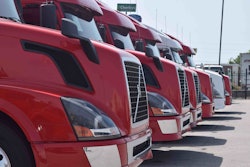Ever feel as if the trucking industry is like a small store owner being assailed to pay mobsters for protection? Where is that line between governing and intimidation?
RICO laws apply to organizations that threaten and intimidate. RICO is the abbreviation for the Racketeer Influenced and Corrupt Organizations Act. “Introduced in 1960 to prosecute corrupt criminal organizations, it has been applied to other groups. Candidates for RICO charges must commit at least two ‘predicate’ crimes in a laundry list of illicit behaviors. Predicate is a term defining an offense which is “a component of a larger crime.” According to Wikipedia, “In a financial context, the predicate offense would be any crime that generates monetary proceeds.”
A criminal enterprise shaking down a neighborhood store for protection money would be a predicate crime. Mail and wire fraud are predicate crimes, not just the more obvious ones like kidnapping, arson, bribery and such. Where is the line between negotiation and intimidation?
The March 26 anniversary of the destruction of the Baltimore Francis Scott Key Bridge in 2024 seems like a metaphor for trucking industry regulation. The Key Bridge rapid unscheduled disassembly took mere seconds. The entire video of the containership losing power and then colliding with the bridge occurs in less than 4 minutes. Clearing the wreckage of the bridge, freeing the containership and recovering the bodies took roughly two months. The Key Bridge was originally constructed over a five year period from 1972 to 1977. Current recovery plans estimate at least four years to rebuild the bridge. The metaphor for trucking is that tearing things down is easy and quick. Building something useful takes time and commitment.
The trucking regulatory world is faced with significant changes, forced reductions of personnel, rescinding regulations, elimination or restrictions in funding, technological shifts and more. Breaking things quickly is a foundation of some rapid development methods, particularly those in emerging technologies. The key to this approach is that breaking is in concert with building towards a goal.
What are the goals being pursued now? Other than breaking the existing status quo? The freight industry – fleets, OEMs, shippers, state DOT’s, safety officials, etc. – might benefit from visualizing the new goals.
When the 55-mph national speed limit was instituted in the late 1970s, it was in response to an international oil crisis that had quickly driven up fuel costs for U.S. customers. Demand exceeded supply because supply had been curtailed by foreign agencies, driving up prices. The 55 mph national speed limit was an aggressive step to reduce demand for fuel because fuel use is directly tied to speed. Lower speeds use less fuel. Less fuel use means better supply. Better supply means lower market pricing. There were government threats to stop federal highway spending in states that did not comply.
The OPEC manufactured oil crisis and the U.S. government mandated 55-mph limit were both seen as acceptable behaviors of governments and organizations. Yet, both could be construed as threatening and intimidating behavior reminiscent of criminal activities. The public did not get to vote for an oil crisis or vote for the 55-mph speed limit, yet we got both. We largely accepted, grudgingly, that the speed limit was a significant national response to foreign agitation. Eventually, people got to weigh in on that through voting for representatives at state and federal levels. In time, the oil crisis abated and speed regulations largely went back to states for control.
A foundation of the U.S. government is that it is supposed to help manage the country for us. It’s right there in the first paragraph of the Constitution, “We the People of the United States, in Order to form a more perfect Union, establish Justice, insure domestic Tranquility, provide for the common defense, promote the general Welfare, and secure the Blessings of Liberty to ourselves and our Posterity, do ordain and establish this Constitution for the United States of America.”
We have authorized the government to act on our behalf, like hiring a 3PL to move our freight. Just like dealing with a 3PL, to some extent, we get what we pay for. Services can be considered great, good, bad — it really depends on your point of view, but in the end, we’ve essentially hired the government to do work for us.
The government is empowered to do all that bureaucracy that is needed to keep the country functioning and protected. If we don’t like how its being run, we influence management through voting in new players. It’s not the most efficient system. Winston Churchill famously said, “No one pretends that democracy is perfect or all-wise. Indeed, it has been said that democracy is the worst form of Government except for all those other forms that have been tried from time to time…”
Where does governing cross into RICO territory? When do dictates cross that line into criminal threats and intimidation?
Does limiting a freight truck to 80,000 lbs. GVWR on federal highways constitute a predicate crime? There are penalties for exceeding this weight. Can a fine be interpreted as a threat of intimidation? Safety inspectors can take a vehicle out of service for being operated in an unsafe manner, for example tires that are worn, broken parts hanging, or lights not functioning. The threat of parking a truck or being fined reinforces keeping vehicles in proper operating condition. Does that constitute a predicate crime?
We the people have authorized the government to protect us, so I would say those safety inspections, fines and such are just the cost off doing business in the U.S.
Is a 100% or 200% tariff to stifle foreign competition a predicate crime? Isn’t the government just doing what we asked them to do? This seems like a very gray area since the U.S. was created out of a revolt on being taxed without representation. Tariffs ultimately effect the cost of goods. To some extent, our costs will go up if tariffs go up. Is a tariff then a tax?
I expect that is a question of semantics and the answer is probably no, not officially. And laws and judges are picky about official definitions.
The trucking industry exists inside the guidance of local, state and federal governments. Do rules, any rules, inherently threaten and intimidate? Obviously.
Do any of these threats constitute crimes? Are the people we empower in government to make and apply rule inherently criminals. No. They are people we tasked to do that tough job. Right sizing government agencies is the prerogative of those in charge, just as we see in the corporate world. Layoffs and corporate downsizing occur frequently in the freight industry. They are usually described succinctly as business economic decisions made by management. Those human resource actions are generally done professionally, without personally impugning the character of dismissed employees. Downsizing in government should be no different. Civil servants are not criminals, they are the epitome of patriotism. We should treat them with respect and professionalism.
Demonizing government civil service is a deep hole to dig out of later – when government is needing staff and no one wants to apply. Breaking things to improve is one method, but it requires also an end objective, goals, a vision. What is trucking’s regulatory future?










